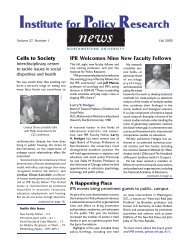pdf - Institute for Policy Research - Northwestern University
pdf - Institute for Policy Research - Northwestern University
pdf - Institute for Policy Research - Northwestern University
Create successful ePaper yourself
Turn your PDF publications into a flip-book with our unique Google optimized e-Paper software.
P. Reese<br />
Political scientist Benjamin Page,<br />
Gordon S. Fulcher Professor of Decision<br />
Making, is working on a new project<br />
on inequality and acquiescence with<br />
Lawrence Jacobs of the <strong>University</strong> of<br />
Minnesota. They are currently conducting<br />
a national survey to explore various<br />
hypotheses about U.S. citizens’ reactions<br />
to economic inequality. In particular they<br />
are looking at whether citizens perceive<br />
its growth and extent, whether they want<br />
to reduce inequality or think incentives<br />
are necessary to do so, whether they favor<br />
or oppose various government policies<br />
with redistributive impact as in Social<br />
Security, national health insurance,<br />
education, and progressive taxes. The two<br />
researchers plan to test many political<br />
science theories, including some going<br />
back to Louis Hartz, about American<br />
exceptionalism. They anticipate that<br />
some of these theories, which have<br />
become ensconced as conventional<br />
wisdom, will turn out to be mistaken.<br />
Social Security<br />
Social policy professor Fay Lomax Cook<br />
worked with IPR graduate research<br />
assistant Amy DeSantis on a project<br />
called “How George W. Bush’s Grand<br />
Plans <strong>for</strong> Social Security Failed: Did<br />
Public Opinion, Organized Interests,<br />
and <strong>Policy</strong> Feedback Matter?” Following<br />
a proposal in his 2005 State of the Union<br />
Address to partially privatize Social<br />
Security, Bush set out on a 60-day, 60-<br />
city tour to promote it. By late fall 2005,<br />
however, various commentators on the<br />
Left and the Right had pronounced<br />
his proposal dead. Cook and DeSantis<br />
are examining how the proposal’s fate<br />
played out through public opinion<br />
(polls), interest groups (media coverage),<br />
and recommendations by policy elites<br />
(congressional testimony). Their analysis<br />
suggests that a combination of these<br />
factors acted to push Bush’s Social<br />
Security proposal off the agenda.<br />
Political scientist Andrew Roberts is also<br />
looking at Social Security through the<br />
lens of pension privatization around the<br />
world. A growing number of countries<br />
are trying to escape the financial pressures<br />
of aging populations by either fully or<br />
partially privatizing their<br />
pension systems. This<br />
project explores the politics<br />
behind these switches,<br />
investigating why and<br />
when privatization takes<br />
place. This project specifies<br />
a number of conditions<br />
in which privatization<br />
becomes politically<br />
palatable—specifically,<br />
a loss of trust in the<br />
public system and relative<br />
confidence in financial<br />
markets. He finds support<br />
<strong>for</strong> these mechanisms in<br />
public opinion, the policy<br />
process in new democracies, and the<br />
attempted privatization of Social Security<br />
in the United States.<br />
Politics and Political Parties<br />
Why did neoliberal policies of tax cuts,<br />
reduced social spending, deregulation,<br />
and privatization gain prominence in the<br />
United States under Ronald Reagan and<br />
in Britain under Margaret Thatcher, but<br />
not in similarly industrialized Western<br />
countries such as France or Germany?<br />
In The Politics of Free Markets: The<br />
Rise of Neoliberal Economic Policies<br />
in Britain, France, Germany, and the<br />
United States (<strong>University</strong> of Chicago<br />
Press), sociologist Monica Prasad<br />
undertakes a comparative-historical<br />
analysis of the development of neoliberal<br />
policies in these four countries. She argues<br />
that neoliberalism was made possible in<br />
the United States and Britain not because<br />
the Left in these countries was too weak,<br />
but because it was, in some respects, too<br />
strong.<br />
Sean Gailmard, Wesley Skogan,<br />
and Benjamin Page share their thoughts<br />
following an IPR colloquium.<br />
www.northwestern.edu/ipr 27
















